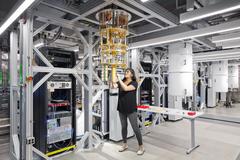IBM is leading in the development of quantum computers. Credit: IBM
Researchers have published an important white paper identifying activities in particle physics where emerging quantum-computing technologies could be applied. With quantum computing rapidly improving, the paper sets out where these could be applied within particle physics, in order to help tackle computing challenges related to not only the upgrade programme of the Large Hadron Collider at CERN in Geneva but also to other colliders and low energy experiments world-wide, including several where DESY plays a major role. The paper, authored by experts from DESY’S Center for Quantum Technologies and Applications (CQTA) in Zeuthen, CERN, IBM Quantum, and over 30 other organisations, is now available on arXiv.
The paper was produced by a working group set up at the first-of-its-kind “QT4HEP” conference, held at CERN last November. Over the last eight months, the 46 people in this working group have worked hard to identify areas where quantum computing could provide a significant advancement. The areas identified relate to both theoretical and experimental particle physics. The paper maps these areas to “problem formulations” in quantum computing. This is an important step in ensuring that the particle physics community is well positioned to benefit from the massive potential of breakthrough new quantum computers when they come online.
“With quantum computing, we address problems in these areas that are very hard or even impossible to tackle with classical methods,” says DESY particle theorist Karl Jansen, director of the CQTA at DESY in Zeuthen. “In this way we can explore physical systems where we do not have access to so far.”
In terms of theoretical particle physics, the authors identify promising areas related to real-time phenomena, lattice-gauge theory, neutrino oscillations, and even quantum field theories in general. The considered applications comprise quantum dynamics, hybrid quantum/classical algorithms for static problems in lattice gauge theory, optimisation, and classification.
On the experimental side, the authors identify areas related to jet and track reconstruction, extraction of rare signals, for-and-beyond Standard Model problems, parton showers, and experiment simulation. These are then mapped to classification, regression, optimisation, and generation problems. These applications would be possible not just for collider experiments such as at the Large Hadron Collider, but also for other experiments where DESY is deeply involved, such astroparticle physics observatories such as IceCube at the South Pole and dark matter particle candidate searches such as ALPS II on the DESY campus in Hamburg.
“Quantum computing is very promising, but not every problem in particle physics is suited to this mode of computing,” says Alberto Di Meglio, head of the CERN Quantum Technology Initiative (CERN QTI) and, next to DESY’s Karl Jansen and Ivano Tavernelli from IBM Quantum, one of the lead authors of the paper. “It’s important to ensure that we are ready and that we can accurately identify the areas where these technologies have the potential to be most useful for our community.”
Members of the working group behind this paper will now begin a process of selecting specific use cases from the activities listed in the paper to be taken forward through the CERN’s and DESY’s participation in the IBM Quantum Network, and collaboration with IBM Quantum, under its “100x100 Challenge”. IBM Quantum is a long-standing contributor to both CERN QTI and CERN openlab, as well as CQTA at DESY.
IBM Quantum’s 100x100 Challenge will see the company provide a tool capable of calculating unbiased observables of circuits with 100 qubits and depth-100 gate operations in 2024. This will provide an important testbed for taking forward promising selected use cases, both from particle physics and other research fields.
The CQTA is funded by the federal state Brandenburg (see DESY News: Brandenburg fördert Zentrum für Quantencomputing mit 12,8 Mio. Euro) and is part of the new strategic initiative “DESY Quantum”. DESY Quantum comprises research and development as well as technology transfer for Quantum Computing, Quantum Materials, Quantum Control and Quantum Sensing.
Reference:
Quantum Computing for High-Energy Physics: State of the Art and Challenges. Summary of the QC4HEP Working Group; The QC4HEP Working Group; arXiv; DOI: 10.48550/arXiv.2307.03236








